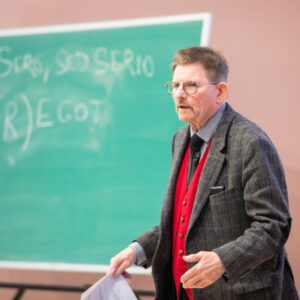Each month, we ask a member of faculty to tell us about one book that played an outsized role in making them who they are today. This month, on the eve of his retirement, Associate Professor of Humanities Tom Curran forswears the standard Q&A format and shares his Words to Live By.
 Someone has explained that for any book you profoundly value, you actually need always to have access to three copies: one to mark up and annotate; one to keep for your library collection; and one ready to be given away.
Someone has explained that for any book you profoundly value, you actually need always to have access to three copies: one to mark up and annotate; one to keep for your library collection; and one ready to be given away.
While I enthusiastically support this bibliophile approach — I seem to have stretched the dictum significantly further.
Perhaps, you might think that a Julia Roberts/Mel Gibson cinema vehicle is not an appropriate reference for our distinguished King’s alumni—but the 1997 movie reveals a strategy that—unwittingly, in my case, and over time—I myself have adopted.
As the movie title Conspiracy Theory suggests, the lead male character is convinced of the existence of multiple high-level governmental and corporate coverups—which express themselves at all levels of the North American social order. Everyone, for instance, obviously, knows that the United States Air Force has been covering up what really happened at Roswell, New Mexico, in 1947 (cf. The X-Files) … so that military misdirection has been employed there for well over seven decades. That we should still need to expose what really happened at the (supposed) the crash of a weather balloon—which then, clearly, deposited alien debris — please………..
At one point (JuliaR) is admitted to (MelG’s) New York apartment—a flat which is a shrine to the investigation and exposure of significant on-going cover-ups and mendacious government activity. Looking around at the stacks of conspiracy tomes and mountains of newspaper cuttings, (JuliaR) becomes aware of copy after copy of J.D. Salinger’s cult classic, The Catcher in the Rye (1951) — therefore published only four years after the Roswell crash — presumably another clue!
Anyway, with respect to the movie’s developing narrative, this correspondent needs to report that, whatever you think of this particular cinema genre, we are treated to some very convincing professional acting, in a scene which I have never forgotten. (MelG) explains, or more truthfully doesn’t explain, that he becomes very agitated or nervous if he is separated for too long an interval from a copy of the (mis)adventures of Holden Caulfield—whom Salinger enabled to speak for more than one generation of American youth.
If (Mel’s) anxiety levels become too high, and his apartment library is inaccessible for too long, then (MelG) needs immediately to purchase a copy of The Catcher in the Rye as a way to steady his nerves—a fact that engenders serious consequences in the “conspiracy” that underlies the film.
 So ……………….. since my mother lived in Germany, and my brother now lives in Vienna, the visiting of German-language bookshops in Germany, Austria and Switzerland is an essential component of every visit. And with every visit, I either have to buy (or if necessary, order) a copy of an anthology of Hermann Hesse’s writings entitled: Mit der Reife wird man immer jünger. Although Hesse (for Canadians, the famous author of Steppenwolf—“Born to be Wild”) actually died in 1962 — this collection of his writings concerning aging was only published in 2002—and if I can’t get my hands on a copy very soon after landing in Europe, I too become agitated, unsettled and paranoid. Please don’t ask me to explain this: very much in the same vein as (MelG), I don’t actually have to be reading the Hesse collection, I just have to know that a copy is close at hand, in case I need to consult it, or look something up, or just even do nothing more than hold it in my hands for a few minutes. I hope Julia Roberts never has an occasion to look around my bookcases.
So ……………….. since my mother lived in Germany, and my brother now lives in Vienna, the visiting of German-language bookshops in Germany, Austria and Switzerland is an essential component of every visit. And with every visit, I either have to buy (or if necessary, order) a copy of an anthology of Hermann Hesse’s writings entitled: Mit der Reife wird man immer jünger. Although Hesse (for Canadians, the famous author of Steppenwolf—“Born to be Wild”) actually died in 1962 — this collection of his writings concerning aging was only published in 2002—and if I can’t get my hands on a copy very soon after landing in Europe, I too become agitated, unsettled and paranoid. Please don’t ask me to explain this: very much in the same vein as (MelG), I don’t actually have to be reading the Hesse collection, I just have to know that a copy is close at hand, in case I need to consult it, or look something up, or just even do nothing more than hold it in my hands for a few minutes. I hope Julia Roberts never has an occasion to look around my bookcases.
The title of the Hesse volume—taken from his writings—could loosely be translated in this vein: “As one matures, one becomes ever younger” or, “Reaching maturity, one always comes back to youth.” In Shakespeare’s Hamlet, the same thought is—if you will permit me to speak this way—put more crudely by Rosencrantz: “for they say an old man is twice a child.”
I am going to assert, by way of contrast, that Hesse’s reflections on aging are the most moving imaginable, and the anthology has become a kind of vade mecum in my life.
A Swiss physician named Paul Tournier has explained that old age should not be treated as a “disease” or as an illness, but as the Sabbath of our lives. And then, Hermann Hesse explains that every stage of life, independently, has its own set of duties and strengths, and even old age can come to be considered as a vocation—a message that not only inspires, but also one that calms me down and frees me from excessive agitation.
As these words are being polished, very shortly after the final lecture in FYP for 2023/2024, and on a stopover on my way to visit my brother, Patrick (The Revd Canon Patrick Curran, BA’80), in Vienna, there is at least one certainty in life. As soon as possible after I land in Austria tomorrow, I shall be visiting a bookstore in Vienna, so as to secure a copy of an inexpensive paperback volume, entitled: Mit der Reife…

